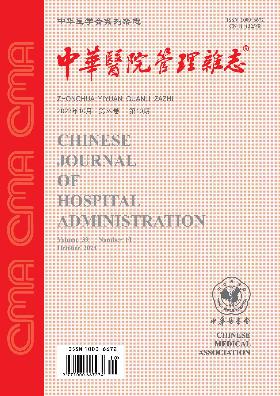Text analysis of China′s family physicians contracted service policy based on policy tools
引用次数: 0
Abstract
Objective To analyze the policy texts related to the contracted service of family physicians, and probe into the key points and existing problems of the policy in the process of promoting the contracted service of family physicians in China, for the purpose of providing references for the optimization and perfection of the system. Methods A total of 54 relevant policy texts issued by the Central Government from 2011 to 2019 were selected, for establishing a two-dimensional analysis framework based on policy tools and stakeholders.By means of quantitative analysis of policy text and literature research method, we analyzed the relevant policy texts. Results Study of the 54 texts found 52.8%(124/235)mentioned commands and regulatory tool use, 27.2%(64/235)mentioned capacity building tool use, 13.2%(31/235)mentioned information and exhortation tool use, 5.1%(12/235)only mentioned incentive tool use, and 1.7%(4/235)only mentioned system change tool use; while most of them(34.3% and 32.7%)mentioned government and physicians, and only a few(17.6% and 15.4%)mentioned patients and medical entities. Conclusions It is suggested to optimize the policy tools mixture, and increase the use of incentive tools to physicians, and explore new forms of system change tools.It is also proposed to pay more attention to resource allocation of primary medical institutions, and to patient awareness and satisfaction. Key words: Family physicians; Contracted service; Policy tool; Text analysis基于政策工具的中国家庭医生签约服务政策文本分析
目的分析与家庭医生签约服务相关的政策文本,探讨我国推进家庭医生签约业务过程中的政策要点和存在的问题,为制度的优化和完善提供参考。方法选取2011-2019年中央政府发布的54份相关政策文本,建立基于政策工具和利益相关者的二维分析框架。通过对政策文本的定量分析和文献研究方法,对相关政策文本进行了分析。结果对54篇文本的研究发现,52.8%(124/235)提到命令和监管工具的使用,27.2%(64/235)提及能力建设工具的使用、13.2%(31/235)提到信息和劝告工具的使用以及5.1%(12/235)只提到激励工具的使用和1.7%(4/235)只提到系统变革工具的使用;大多数人(34.3%和32.7%)提到政府和医生,只有少数人(17.6%和15.4%)提到患者和医疗机构。结论建议优化政策工具组合,增加对医生的激励工具使用,探索新形式的制度变革工具。还提出要更加重视基层医疗机构的资源配置,重视患者的知晓率和满意度。关键词:家庭医生;承包服务;政策工具;文本分析
本文章由计算机程序翻译,如有差异,请以英文原文为准。
求助全文
约1分钟内获得全文
求助全文

 求助内容:
求助内容: 应助结果提醒方式:
应助结果提醒方式:


